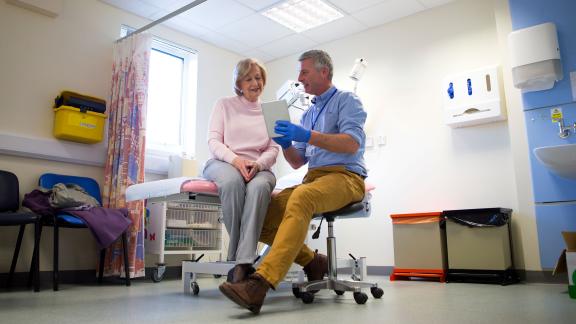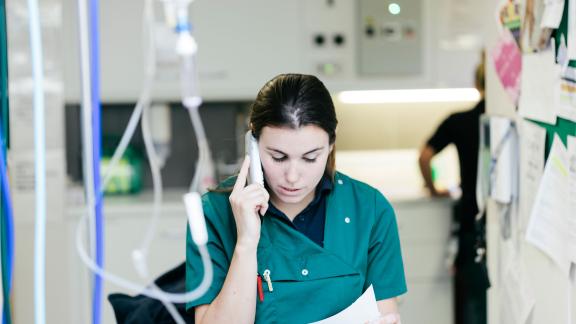FAQs [Withdrawn]
The following DHSC guidance was withdrawn on 7 July 2022 and is now archived.
This guidance applies to NHS organisations, outsourced services and to NHS services commissioned from non-NHS organisations. Where the guidance specifically refers to national contracts, it applies to those staff covered by national contracts.
Staff stuck overseas
1. An employee is stuck abroad to a travel ban or quarantine and unable to return to work, what should they be paid?
Employers should explore the individual circumstances with the employee. Where staff are in quarantine, they should be treated as self-isolating and paid accordingly.
Where employers are satisfied an employee is stuck abroad due to COVID-19 and there is no reasonable prospect of them being able to return to work, the national temporary COVID-19 special leave should be used.
Caring commitments
1. What do we pay staff whose children are unable to attend school, nursery or childcare as a result of closures, or because they have been sent home to self-isolate, or have COVID-19 symptoms?
UPDATED 8 JANUARY
Where a child has a suspected case or confirmed case of COVID-19 and there is a government requirement for the employee to self-isolate
Where an employee is living with a child who has or is suspected of having COVID-19, they will need to self-isolate for the required period as advised by government. Where they are unable to work from home, either in their substantive role or by temporarily reallocating work from within the organisation or the NHS more widely, they will be entitled to paid COVID-19 special leave
Employees should be aware of their legal requirement to complete the appropriate period of self-isolation. In cases of suspected infections within schools or early years settings this could come about through contact from the NHS Test and Trace service, or because they live in a household with a child who has symptoms or has tested positive for COVID-19.
Employing organisations are also legally required to ensure an employee fulfils the relevant period of self-isolation as advised by government.
Where a child is sent home due to a COVID-19 case in their bubble and there is no government requirement for the employee to self-isolate
Where an employee’s child has been sent home because they have been in close contact with a suspected case, but does not themselves have symptoms of COVID-19, the child should self-isolate but other members of the household are not required to do so. This will often mean however that alternative childcare is not available or appropriate and may happen at very short notice creating childcare issues for the member of staff which mean they are unable to attend their workplace. The employee will not be entitled to COIVD-19 special leave where there is not a government requirement on them to self-isolate and therefore, employers should be as supportive and flexible as possible when considering options for these employees. Options to consider in relation to each episode include:
- working from home, for example this could include completing online training
- temporarily reallocating work to the employee which could be undertaken at home, either within the organisation or the NHS more widely
- agreeing a temporary change to working arrangements, such as a change of hours or a different combination of shifts that can be organised around care;
- using previously accrued TOIL and allowing additional flexibilities in relation to retention of accrued TOIL in preparation for possible childcare issues
- making up time lost through working additional hours/shifts
- using annual leave, local special leave, local carers’ leave - and allowing leave to be used flexibly and broken down into sessions/hours
- where local paid leave policies have been exhausted consideration of extending them, particularly where an individual does not have another person living within their household with whom they can share the care arrangement
- unpaid leave, as a last resort.
Changes should seek to meet the needs of the individual balanced against the needs of the service at the time.
Shielding
Updated 30 July 2020
Revised guidance on shielding has been published by a joint working group of the NHS Staff Council Executive. This guidance provides advice to support the pausing of national shielding with effect from 1 August 2020. Please follow this link to read the guidance.
The two FAQs below remain relevant in instances where local lockdowns are introduced or where national shielding arrangements are re-imposed.
1. We have members of staff who have been categorised by the government as extremely vulnerable and are therefore ‘shielding’. What should we pay them?
Where individuals are defined as extremely vulnerable by government guidance and are therefore shielding, they may still be able to work from home and employers should explore this with employees. Clearly if they become ill, COVID-19 sick pay will be payable.
Where employees are shielding and there is no prospect of them working from home, employers should follow the advice for self-isolating provided in ESR user notice 2864. Staff should receive full pay through the provision of COVID-19 special leave.
2. What leave and pay is available to staff members who live with individuals who are shielding and feel unable to come to work?
Where staff, who are not themselves required to self-isolate on medical grounds, feel unable to attend work employers should explore the options available with individual. For example:
- working from home
- a temporary voluntary move into alternative accommodation (with or without support from the employer).
Employers will need to be considerate of any care arrangements that may be compromised by staff not being at home. In these instances, employers are encouraged to use maximum flexibility to ensure the needs of both staff and the service are maintained.
Where staff are required to remain at home for the purposes of maintaining care arrangements, employers will need to consider what work can be undertaken at home and, where this is not possible, exercise discretion and use the flexibilities they already have to support staff during this period.
Pay for staff that are told to self-isolate
1. What should an organisation pay a substantive member of staff who needs to self-isolate?
They should be recorded on the Electronic Staff Record (ESR) as special leave for infection precaution or medical suspension purposes and receive full pay, inclusive of any enhancements. Under the related reason field, coronavirus (COVID-19) would need to be selected.
2. Is there a national steer on what the reference period should be for full pay during self-isolation for Agenda for Change (AfC) staff and doctors in training?
Employing organisations are encouraged to align the reference period with section 13 of the NHS terms and conditions of service handbook (for AfC staff) or schedule 10 paragraph 51 of the 2016 terms and conditions (for doctors in training), noting that a statutory change will take effect from 06 April 2020 for staff with irregular hours.
Other reference periods can be locally determined in partnership, however, we would encourage employing organisations to engage with ESR to ensure the system can make those payments.
Any solutions will be for local determination having engaged with neighbouring organisations across the STP/ICS patch.
3. What should a bank member of staff be paid if they need to self-isolate?
Full pay by way of reference period or based on what work they had booked prior to going into self-isolation. This applies to staff who have a bank only contract as well as substantive staff who also hold a bank contract with their employer.
4. The guidance advises that full pay should be inclusive of enhancements. Should this also include overtime for Agenda for Change staff?
Yes, employing organisations should include any overtime as part of the calculation of full pay.
5. The guidance refers to a reference period for full pay when self-isolating for bank staff. What should this be?
Where employers are paying self-isolating bank staff on a look back approach, rather than on the basis of shifts already booked, organisations are encouraged to align the reference period with section 13 of the NHS terms and conditions of service handbook (for AfC staff) or schedule 10 paragraph 51 of the 2016 terms and conditions (for doctors in training), noting that a statutory change will take effect from 06 April 2020 for staff with irregular hours.
Other reference periods can be locally determined in partnership, however, we would encourage employing organisations to engage with ESR to ensure the system can make those payments.
Any solutions will be for local determination having engaged with neighbouring organisations across the STP/ICS patch.
6. What will happen for staff provided by NHS Professionals (NHSP) who need to self-isolate?
NHSP have written to NHS organisations to advise that they will be following the same approach as for NHS substantive staff. NHSP has developed a number of FAQs which are available on their website.
7. What would an agency member of staff be paid if they must self-isolate?
This would be a matter for the agency to address. The agency would need to ensure that the staff being sent to undertake a shift have not been advise to self-isolate. Trusts might consider asking agency staff if they wish to join their internal staff bank.
8. Should agency staff be considered as sub-contractors for the purposes of ensuring they receive full pay?
No, for the purpose of this advice agencies are not considered to be sub-contractors and, therefore, would not receive full pay during periods of self-isolation.
9. What should we do if an employee refuses to come to work but they have not been advised to self-isolate?
Employers should explore the reasons for this refusal to come to work and see if any of the member of staff’s concerns or fears can be addressed. This could include whether there are alternative work options that will address the issues such as working from home, or a period of unpaid leave.
If a solution cannot be reached, and all reasonable steps have been taken, then this would need to be addressed via local conduct policies as a last resort.
Sickness absence pay
1. What should someone be paid if they are off sick with COVID-19?
This absence should be recorded as sickness with the most appropriate reason for absence selected (for example respiratory problems). Under the related reason field, Coronavirus (COVID-19) would need to be selected. Staff should receive full pay inclusive of all enhancements
2. What should someone be paid if they are off with a non-COVID-19 illness?
They should be paid according to the section 14 (England) arrangements of the NHS terms and conditions of service handbook or the equivalent provisions in the medical and dental terms and conditions.
3. Should COVID-19 absence be included in the sickness absence triggers?
No, COVID-19 sickness absence should not be included for the purpose of local sickness management triggers.
4. How should returning to work after COVID-19 sickness absence be managed?
The local sickness management procedures should be followed in conjunction with any local and national infection control requirements.
5. Should employees provide a fit note (sick note) for any COVID-19 sickness absence that lasts longer than seven days?
The latest process regarding fit notes can be found on the NHS 111 Online website.
6. When are the changes to sick pay for those with COVID-19 effective from?
This is specific to each employing organisation and will depend on when the first episode of COVID-19 related sickness was recorded.
Staff members absent with COVID-19 sickness will receive full pay including all enhancements. Therefore, this new temporary entitlement is available to use by employing organisations when it is needed.
7. Should COVID-19 sickness periods be taken into consideration, when calculating future sickness entitlements that are unrelated to COVID-19?
No. A separate temporary full-pay sickness entitlement is available for those off sick with COVID-19. Periods of COVID-19-related sickness would not be counted towards the normal sickness entitlements as set out in section 14 paragraph 14.2 and the related pay calculations at paragraph 14.7.
8. The guidance advises that full pay should be inclusive of enhancements. Should this also include overtime for Agenda for Change staff?
Yes. Employing organisations should include any overtime (where these are regularly paid supplements) as part of the calculation of full pay.
9. Should bank workers receive full sick pay if they are unable to work because they are off sick with COVID-19?
NHS England and NHS Improvement have made clear that full pay should be paid to bank staff where they need to self-isolate. Full pay should also extend to bank staff who become ill with COVID-19.
The COVID guidance explains that during self-isolation bank workers should be paid on the basis of either the shifts they have booked, or based on a look-back approach, looking at previous bank earnings.
For consistency, it is recommended that previous bank earnings over a reference period are looked at as a basis to calculate full pay.
Where an individual does not have regular bank earnings as a basis to calculate full pay (for example, they have only recently joined the bank to help in the emergency), organisations should pay sick pay on the basis of what the individual would have been paid during their self-isolation, in cases where the individual had been isolating immediately prior to becoming ill with COVID-19. If this is not known, organisations will need to look at what a reasonable benchmark would be to set full pay at.
Where a bank individual is off sick with COVID-19 and there is no way to assess full pay (i.e. because the individual has no future shifts booked, or because there are not sufficient previous earnings), organisations will need to look at what a reasonable benchmark would be to set full pay at.
10. We have a member of staff who has self-isolated with suspected COVID-19 and is being paid COVID-19 special leave. They have now tested negative for COVID-19, should they have qualified for COVID-19 special leave and how should the absence be recorded on ESR?
Where an individual has been self-isolating with suspected COVID-19, in line with public health advice, they would be entitled to COVID-19 special leave. If they subsequently test negative, their previous COVID-19 special leave would stand and the absence would not have any impact on sick leave entitlements or triggers.
Appointment of recently retired staff
1. We are appointing staff who have recently retired to help with the COVID-19 pandemic. What pay point should they be placed on?
Recently retired Agenda for Change staff (staff who retired within the last three years) who are recruited to support with the COVID-19 pandemic will be appointed to the top pay step point of the appropriate pay band, providing they previously worked in that pay band (or higher).
Medical and dental staff returning from retirement should have their pay calculated in accordance with the relevant terms and conditions of service.
Overtime
1. Should AfC staff in bands 8 and 9 receive overtime for any additional hours they work in excess of 37.5 per week?
Staff in bands 8 and 9 are not eligible to receive contractual overtime payments in line with section 3 of the NHS terms and conditions for any additional hours they work in excess of standard hours (37.5 per week). Employing organisations can, however, make a local decision to pay overtime rates for COVID-19 related activities, where they deem this to be appropriate.
2. How should part-time staff be paid for any additional hours worked above their contracted hours to support with the COVID-19 pandemic?
For Agenda for Change staff, any additional hours worked up to 37.5 per week (standard hours) will be paid at plain rate plus any applicable enhancements as set out in section 2 (England). This applies in instances where part time staff work in excess of their contracted hours, but who may not have worked in excess of 37.5 hours.
Where staff are contractually entitled to receive overtime for any hours worked in excess of 37.5 hours per week per contract, this should be paid at the correct overtime rate (paragraph 2.9, section 2 (England)).
Medical and dental staff would be paid for any additional hours in accordance with their contractual terms and conditions of service (TCS).
Note that for all staff, any hours worked up to full time are pensionable, but any hours that attract overtime pay are not pensionable.
High Cost Area Supplements (HCAS) and temporary reassignment
1. What happens to HCAS payments if a staff member is temporarily reassigned to a different base due to the COVID-19 pandemic?
The expectation is that the staff member would not suffer a financial detriment as a result of being temporarily reassigned due to operational COVID-19 related decisions.
| Change in base | HCAS application |
| Temporary base no longer falls in a HCAS zone | The individual will continue to be paid the HCAS rate as if they were still at their permanent work base. |
| Temporary base falls in a lower banded HCAS zone | The individual will continue to be paid the HCAS rate as if they were still at their permanent work base. |
| Temporary base falls in a higher banded HCAS zone | The individual will be paid at the higher HCAS rate pending the return to their permanent work base. |
These arrangements will also apply to any applicable London weighting for doctors and dentists.
Furlough
1. We have furloughed staff from external non-NHS organisations who are willing to support us during the COVID-19 pandemic. Where individuals are taking up paid employment with us, what are our responsibilities?
NHS organisations should initially consider utilising furloughed workers on an unpaid volunteer basis wherever possible. Furloughed workers joining on an unpaid basis may also be eligible for travel and other expenses. Where furloughed staff from external non-NHS organisations (e.g. the airline industry) seek to take up paid employment within the NHS to support with the COVID-19 pandemic, it would the individual’s responsibility to understand if they are contractually permitted by their existing employer to do so. Employing NHS organisations should not be asked to determine if individuals are permitted to take up paid employment whilst furloughed. Individuals are also responsible for understanding any interactions with tax that taking up paid secondary employment would have.
As part of any new employment, individuals would need to complete the starter checklist form (PDF) and ensure that ‘Statement C’ is completed.
Pay protection
A joint working group of the NHS Staff Council Executive have produced FAQs on pay protection during the COVID-19 period.



